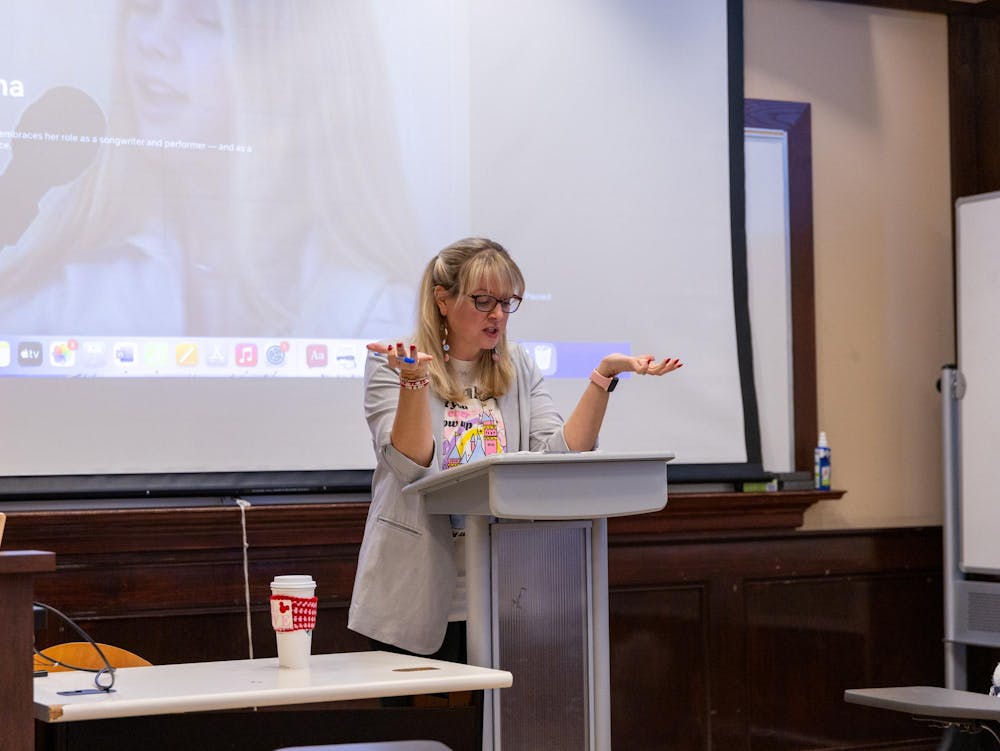Mini-Course on Taylor Swift Encourages Reflections on Personal Growth
Part of the The Purpose Project at Duke, What Now? is a network of first-year courses across the disciplines where questions of happiness, purpose, and other ethical concepts are key. Once-a-week experiential learning sessions bring What Now? students and faculty together to explore resources at Duke, develop connections, and to reflect on the ideas presented in their courses.
What Now? also offers three-week “mini-courses” that allow students to learn from faculty members across the network. Written by Audrey Patterson, this article about Lisa Andres’s mini-course on Taylor Swift was originally published in the Duke Chronicle.

After a three-week lesson series on the lyrics of Taylor Swift songs, these students knew “All Too Well” about the broader implications of what the pop singer represents.
Lisa Andres, lecturing fellow of the Thompson Writing Program, has been delving into the lyrical prowess and rhythms of Taylor Swift as part of the “What Now?” ethics half-credit course.
Throughout the three-week miniseries, Andres guided her class through an exploration of several albums including “Midnights,” “Reputation” and “Lover.”
Andres wrote in an email to The Chronicle that Swift’s autobiographical songwriting traced her “shifting conceptions of happiness in the wake of broken hearts, media scrutiny and emotional growth,” as well as the cultural response to these changes.
While the series offers an outlet for Swifties to find new songs to add to their playlists, Andres hopes that exploring the lyricism and cultural context of different phases of Swift’s life will help students consider their own journeys and interactions with the changing world around them.
In one class, Andres projected the lyrics to Taylor Swift’s “I Forgot That You Existed” and pressed play on her computer. After a couple of minutes of foot tapping, lip-syncing and head bobbing, Andres asked the class how they perceive the lyrics in the wake of a male artist’s public bashing of Swift.

Andres delved into a discussion about indifference and moving on as a takeaway for students.
“I think for me personally, when I listen to music I don’t often think about the lyrics behind it or the meaning … I think analyzing it is really important because you can learn more about the artist,” first-year Saanvi Cherukumalli said.
Despite teaching about Swift’s musical work, Andres wants students to learn beyond Swift and more about what she represents.
“Things that belong to popular culture — like Disney, like Harry Potter, like Taylor Swift — are often more powerful teachers because people don’t see them as purposefully pedagogical,” Andres wrote. “Yet they often reveal — with startling clarity — the larger questions and struggles we’re currently trying to navigate.”
Andres showed clips of Taylor Swift’s documentary “Miss Americana,” which captures moments from her early life and her humble beginnings as a young country singer. First-year Andrew Sample spoke about how the documentary juxtaposes Taylor’s massive success and how it has “weighed on her in a way that very few have ever experienced.”
Students in the course also analyzed “You’re On Your Own Kid,” a personal narrative on Swift’s recent “Midnights” album.
“To hear that message even though we have very different opinions on her and her music … There is something unifying about a statement of ‘You have what it takes to take the next step,’” Sample said.
Andres hopes that even if students aren’t fans of Taylor Swift, the class at least gives them a new perspective they can approach her and her music with. She wants students to ultimately reflect on their own growth throughout their lives and first year at Duke.
“Do I think students need to know about Taylor Swift specifically? Not necessarily. But I think looking at her catalog of music — the stories she tells, the growth she demonstrates — and at her cultural impact provides fascinating insight into how we’re navigating this current climate,” Andres wrote.
